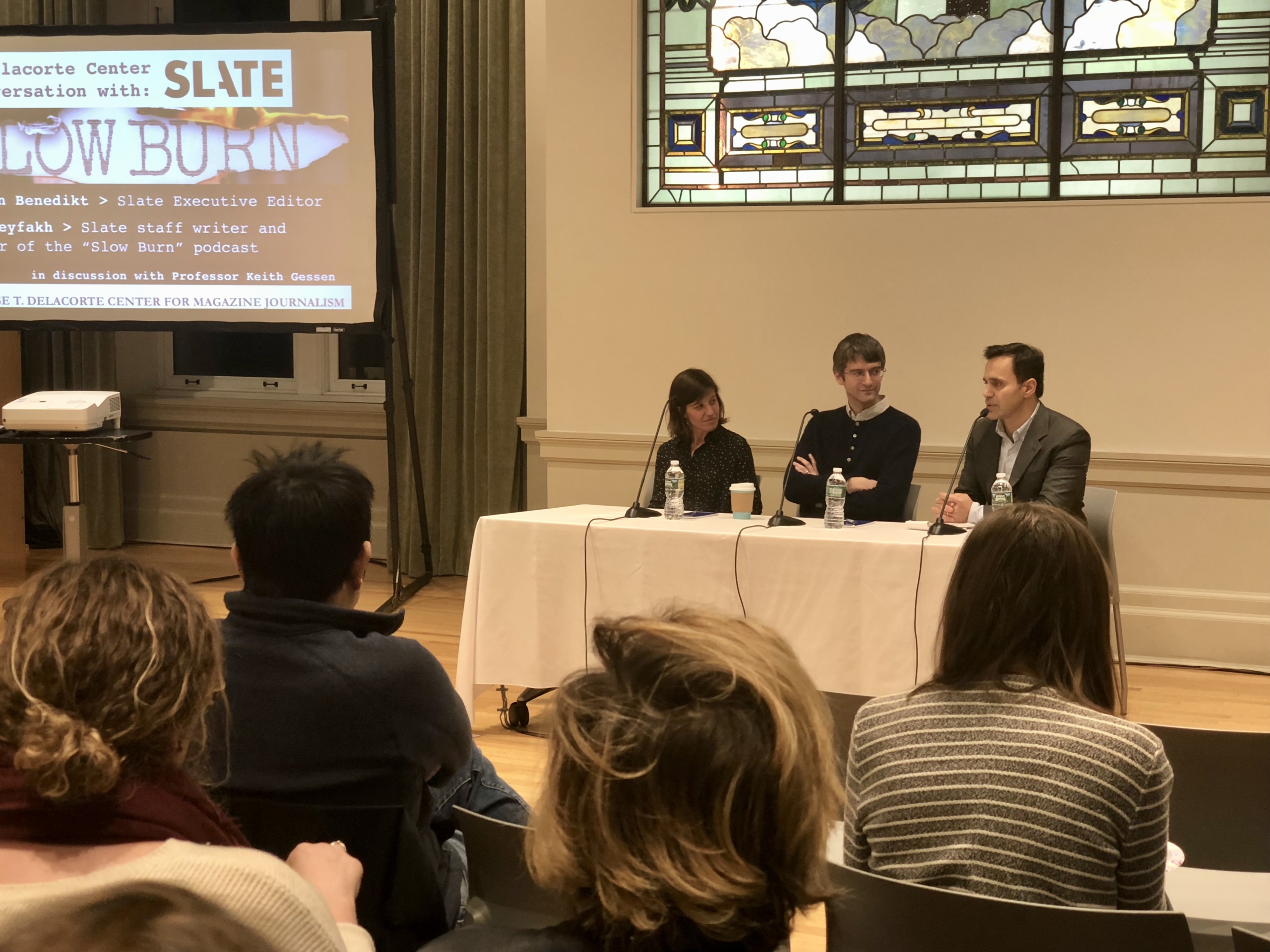Sign up for The Media Today, CJR’s daily newsletter.
For two seasons, Slate’s Slow Burn podcast has delved at length into the half-forgotten personalities and plotlines of American political dramas — first, Watergate, and, in a second season, the Clinton impeachment proceedings — with an eye towards helping listeners sort through the uncertain present.
Helmed by Slate staff writer Leon Neyfakh, who on Tuesday announced plans to leave Slate and produce podcasts independently, Slow Burn’s excavation of history won the show rave reviews and installed it as a crown jewel in Slate’s wide podcast portfolio.
Neyfakh, alongside Slate Executive Editor Allison Benedikt, spoke with Professor Keith Gessen on Wednesday evening, as part of Columbia Journalism School’s Delacorte Lecture Series. He offered insights on his podcast’s development, as well as takeaways from its detailed treatment of historical scandals.
“How did it feel to live through Watergate?” Neyfakh said of Slow Burn’s concept. “And is it reasonable to think that it felt similar to living through today?”
The first season of Slow Burn was originally conceived as a written cover story for Slate, Neyfakh said, early in the Trump administration, when themes of conspiracy and intergovernmental warfare seemed here to stay. As the idea evolved and editors settled on a narrative audio format, Neyfakh, who was then covering the Justice Department for Slate, was an easy choice to host. But, at first, Neyfakh worried there might not be much left in Watergate to mine. “I thought, ‘Everyone’s seen the movie, what are we really going to add to this?’” he said.
As Neyfakh began researching, he said, he realized how much was missing from the popular narrative, including major characters and subplots which made recurrent headlines in their day. (Think the Michael Cohens and Roger Stones who we might also one day forget.) In revisiting details of the Watergate scandal which would seem lost to time, Neyfakh found that he could cast a new light on the vacillations of the current scene, even without drawing explicit parallels. While today, Nixon’s downfall might seem inevitable, Neyfakh said, he was struck as he dug into the details by how many accidents, moments of chance, and unforced errors on the part of the former president came into play. “It was not a reassuring story, because to me it just sort of happened to go the right way,” he said.
In Slow Burn’s second season, Neyfakh enjoyed bringing nuance to characters who even less than two decades on seem overly simplified and categorized. In interviews with the likes of Ken Starr and Linda Tripp, for instance, he said he wanted to draw out where interview subjects were coming from, as opposed to whether they were right or wrong, good or bad. “Experiencing ambivalence is to me more interesting than experiencing conflict with total certitude,” he said, adding that this has become a rarity at a time when political discourse—and journalism—has become largely black and white.
As Benedikt added, “The best journalism has complicated characters and complicated moral questions. It doesn’t have to land. It has to trust to reader, or the listener, to figure it out.”
Slow Burn was Slate’s first foray into narrative podcasting, complete with the high production values found in shows like This American Life and Serial. But Slate was an early pioneer of podcasting in journalism; it went live with Political Gabfest in 2005, when the concept was a relative oddity. The site’s lucrative podcast portfolio has since expanded into the dozens, and today the 22-year-old Slate is best thought of as half-news commentary site and half-podcast production outfit, Benedikt said. It’s an identity that site leadership has only recently come to understand and embrace, she added, but one consistent with Slate’s spot in the digital media landscape.
“One thing Slate has always done is create a real loyalty between our readers and listeners and our voices,” Benedikt said. “And with podcasting, this just works really well. You have someone in your ear and you care about them.”
On his own decision to leave, Neyfakh said he looks forward to the opportunity to work with a larger team, a greater degree of creative control, and ownership of the intellectual property, or IP.
The first season of Neyfakh’s new podcast, which will be entitled FIASCO, is slated for the first half of 2019. It will take a similar approach to history as Slow Burn, with an eye towards Bush v. Gore and the 2000 presidential election.
Slate will remain devoted to narrative podcasts, and podcasts of all kinds, Benedikt said, including a third season of Slow Burn, with a presently unidentified host. “Speaking of IP,” she said, affecting a playfully competitive tone, “we own the name. We own the feed, with the, whatever, 10 million subscribers, so yeah–”
“It’s not 10 million,” Neyfakh said, laughing.
“It’s a bunch,” Benedikt replied. “It’s more than you’re starting with.”
Has America ever needed a media defender more than now? Help us by joining CJR today.



